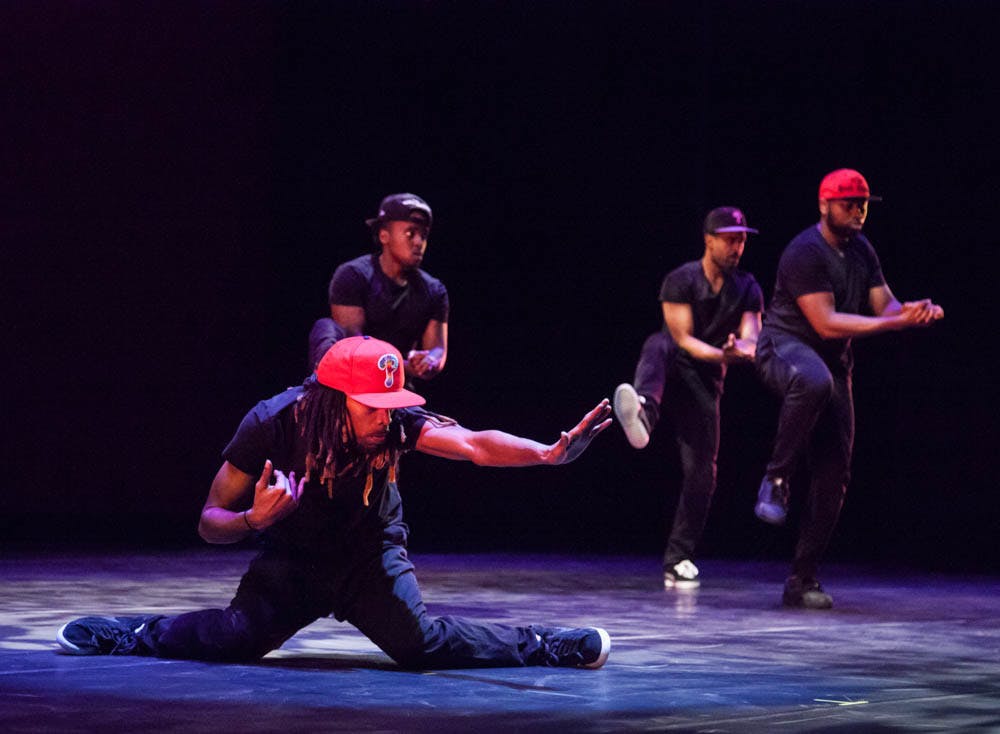Laughter and talk filled Providence’s Veterans Memorial Auditorium — known as the VETS — last Friday as over a thousand people crowded into the theater to see one of the nation’s most celebrated street dance performance groups: Rennie Harris Puremovement.
Founded and led by famed choreographer Lorenzo “Rennie” Harris, the company came to Providence as part of FirstWorks’ Artistic Icons Series, performing a suite of eight works collectively entitled “Nuttin’ But A Word.”
The saying “Nuttin’ But A Word” means that “words dissipate (and don’t) mean anything. I’m going to show you some action,” Harris said. The suite is “not really about anything specific, other than showing physically how this movement translates onstage.”
Backed by the dramatic lighting of the VETS stage, 10 members of Puremovement effortlessly glided in and out of complicated configurations, moving in flawless synchronization to a mix of house, funk and R&B music. Though movements varied from languid to frantically energetic, the dancers consistently maintained a powerful intensity. The suite melded various genres of street dance: dancers b-boyed, popped and locked. They executed backflips, spins and freezes. Every so often, after a particularly impressive sequence, the audience would break into cheers.
“(My work is) all inspired by my childhood,” Harris said. “My process is really simple. … I create a major phrase of choreography, and then I deal with singing and blocking, and then I deal with character … and then I deal with production last.”
He added that the key to any great performance is sincerity. “I’m not going to make a dance about the election just because the election was tumultuous. I’m not going to make a piece about Michael Jackson just because he died,” he said. “I’m not inspired — it’s not sincere. Sincerity means you do it from your heart … your spirit is moved to create.”
Puremovement was founded in 1992 when Harris received a commission request to create 45-minute piece of choreography. Harris, who at the time was studying to become a priest, viewed the request as an excellent opportunity to earn money while also doing something he enjoyed. More people kept booking his performances, and before long, Puremovement had “just … evolved into a company,” Harris said.
Contrary to popular belief, “hip-hop” is not Puremovement’s only dance style. “(People) usually use ‘hip-hop’ as an umbrella term, but it’s actually wrong,” Harris said. In reality, street dancing has a long and complex history, stretching back into the mid-20th century. Hip-hop is merely one subcategory; others include but are not limited to popping, locking, b-boying or breaking, krumping and turfing, Harris said. “If I was just using hip-hop, I think I would be limited and wouldn’t be able to do what I’m doing,” Harris added. Instead, he pulls from various sectors of street dance’s diverse repertoire to use in his work.
Moreover, Puremovement is not purely a performance group; the company is also actively involved in street dance education and outreach — offering programs such as workshops and mentorships across the nation. Harris visited Brown’s campus Feb. 26 and Feb. 27 to participate in the Rhythm of Change Festival, an annual festival held on campus that celebrates African diasporic dance.
The festival, which took place from Feb. 23 through Feb. 26, aimed to “bring together people who are invested and involved in art and social change … people who are stepping outside the normative to bring communities together,” said Michelle Bach-Coulibaly, professor of theatre arts and performance studies and founder and artistic director of Rhythm of Change. This year, the festival focused on hip-hop in particular as a “world-expressive art form that … (permeates) every culture,” Bach-Coulibaly said.
This year’s theme also featured a “subtitle”: “Dancing Difference: Moving Across Our Divides.” Through the festival, participants worked to take responsibility for their own “privilege (and) resources” in order to help bridge national, financial and political divides. Puremovement, along with other recognized individuals and groups such as Director for the Center for the Study of Race and Ethnicity in America Tricia Rose, Daniel Banks and Ana “Rokafella” Garcia, came to Brown to teach classes, give talks and promote education surrounding African diasporic dance and other forms of performance art.
FirstWorks also collaborated with Brown to organize this year’s Rhythm of Change festival. Originally an outgrowth of FirstNight Providence — the city’s annual New Year celebration, FirstWorks was founded to “keep the idea of access of the arts that a festival has … but to also reach youth, and to be doing projects with artists that really affected our whole community,” said Kathleen Pletcher, founder and executive artistic director of FirstWorks. The organization works with artists of all mediums to bring art to the Providence community, in the form of classes, workshops, performances and festivals — similar to Rhythm of Change.
“There’s nothing that brings people together quite as much as a shared experience in performance,” Pletcher said, adding that Harris “is an extraordinary artistic voice and vision … (I’m) so inspired by having him here.”





